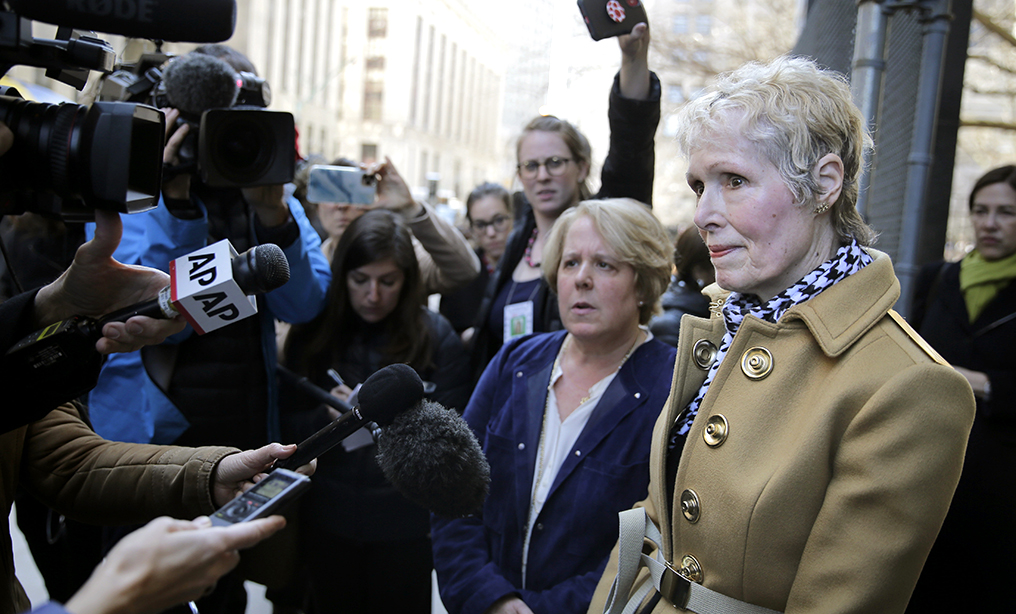Donald Trump's Lawyers Reject Delayed Deposition Schedule in Defamation Case
Roberta Kaplan accused Trump of "cherry-picking" cases, asserting immunity from some lawsuits and moving forward with others. She said the volume of Trump's personal litigation is unlike that of any previous president.
March 04, 2020 at 04:35 PM
4 minute read
 E. Jean Carroll, right, talks to reporters outside Manhattan Supreme Court, Wednesday, March 4. Her attorney Roberta Kaplan is at left. Photo: Seth Wenig/AP
E. Jean Carroll, right, talks to reporters outside Manhattan Supreme Court, Wednesday, March 4. Her attorney Roberta Kaplan is at left. Photo: Seth Wenig/AP
Roberta Kaplan, the attorney for an author and advice columnist who has sued President Donald Trump for defamation, said in a Manhattan Supreme Court appearance Wednesday that some forms of discovery should advance while New York's highest court weighs whether a president can be haled into state court over nonofficial conduct.
But lawyers for Trump said that since he is claiming immunity from lawsuit during his term of office, he is asserting a constitutional right and all discovery should halt while the New York Court of Appeals.
Both sides agreed that a deposition of Trump and a DNA test should not take place until the New York Court of Appeals issued a decision in a case captioned Zervos v. Trump that tests the immunity claim.
But that was about the only note of accord in the appearance before New York County Supreme Court Justice Verna Saunders.
The hearing was the latest in a case brought by the author, E. Jean Carroll, who is suing Trump over his denial of her allegation that he raped her in a Manhattan department store in the 1990s. Trump, in denying the allegation, said among other things that he had never met her and that she made up her story.
Marc Kasowitz of Kasowitz Benson Torres, who is representing Trump, has argued that the case must be stayed until the New York Court of Appeals issues its decision in Zervos, another defamation case against Trump.
In Carroll's case as well as Zervos, Trump has asserted that the Supremacy Clause of the U.S. Constitution precludes a sitting president from being brought into state court for conduct that is not related to his federal duties.
During oral arguments Wednesday, Kasowitz partner Christine Montenegro noted that a federal case that could provide some guidance—Trump v. Vance, which deals with whether a state grand jury can subpoena materials relating to the president—is set to be heard before the U.S. Supreme Court in just a few weeks.
Kaplan of Kaplan Hecker & Fink, told Saunders that the plaintiff's team is willing to delay Trump's deposition and its request for his DNA test until the Court of Appeals has reached its decision in Zervos.
Carroll is seeking the DNA test because there is "unidentified male DNA on the dress that Carroll wore during the attack," according to court papers.
Kaplan said delaying Trump's deposition while proceeding with other discovery involving Carroll, the store where the alleged attack took place and other parts of her account is "a very practical way of organizing" the process.
But lawyers for Trump said an incremental approach could still cause a violation of his constitutional rights.
"That's not sufficient, because we're asking for immunity from a lawsuit," Montenegro said in court. "It's a constitutional right."
Kaplan accused Trump of "cherry-picking" cases, asserting immunity from some lawsuits and moving forward with others. She said the volume of Trump's personal litigation is unlike that of any previous president.
Montenegro disagreed with the allegation of cherry-picking, saying that some of Kaplan's examples are federal cases bound by different rules and another, a brand-new case in which the Trump campaign sued The New York Times, does not involve the president himself.
The Zervos case—which bears a resemblance to Carroll's in that it is a defamation claim over Trump's denial of a sexual misconduct allegations—is not likely to be argued until the fall, Kaplan said.
In Zervos, the plaintiff, Summer Zervos, a former contestant on "The Apprentice" reality competition program, sued Trump for allegedly calling her a liar.
Read more:
Defamation Lawsuit Against Donald Trump Can Be Heard by NY Court of Appeals, First Department Rules
Roberta Kaplan Files Lawsuit Alleging Trump Defamed Author as Liar in Wake of Rape Accusation
This content has been archived. It is available through our partners, LexisNexis® and Bloomberg Law.
To view this content, please continue to their sites.
Not a Lexis Subscriber?
Subscribe Now
Not a Bloomberg Law Subscriber?
Subscribe Now
NOT FOR REPRINT
© 2025 ALM Global, LLC, All Rights Reserved. Request academic re-use from www.copyright.com. All other uses, submit a request to [email protected]. For more information visit Asset & Logo Licensing.
You Might Like
View All

Family Law Practitioners Weigh In on Court System's New Joint Divorce Program

Former NY City Hall Official Tied to Adams Corruption Probe to Plead Guilty

New Charges Expected in Sex Trafficking Case Against Broker Brothers
Law Firms Mentioned
Trending Stories
Who Got The Work
J. Brugh Lower of Gibbons has entered an appearance for industrial equipment supplier Devco Corporation in a pending trademark infringement lawsuit. The suit, accusing the defendant of selling knock-off Graco products, was filed Dec. 18 in New Jersey District Court by Rivkin Radler on behalf of Graco Inc. and Graco Minnesota. The case, assigned to U.S. District Judge Zahid N. Quraishi, is 3:24-cv-11294, Graco Inc. et al v. Devco Corporation.
Who Got The Work
Rebecca Maller-Stein and Kent A. Yalowitz of Arnold & Porter Kaye Scholer have entered their appearances for Hanaco Venture Capital and its executives, Lior Prosor and David Frankel, in a pending securities lawsuit. The action, filed on Dec. 24 in New York Southern District Court by Zell, Aron & Co. on behalf of Goldeneye Advisors, accuses the defendants of negligently and fraudulently managing the plaintiff's $1 million investment. The case, assigned to U.S. District Judge Vernon S. Broderick, is 1:24-cv-09918, Goldeneye Advisors, LLC v. Hanaco Venture Capital, Ltd. et al.
Who Got The Work
Attorneys from A&O Shearman has stepped in as defense counsel for Toronto-Dominion Bank and other defendants in a pending securities class action. The suit, filed Dec. 11 in New York Southern District Court by Bleichmar Fonti & Auld, accuses the defendants of concealing the bank's 'pervasive' deficiencies in regards to its compliance with the Bank Secrecy Act and the quality of its anti-money laundering controls. The case, assigned to U.S. District Judge Arun Subramanian, is 1:24-cv-09445, Gonzalez v. The Toronto-Dominion Bank et al.
Who Got The Work
Crown Castle International, a Pennsylvania company providing shared communications infrastructure, has turned to Luke D. Wolf of Gordon Rees Scully Mansukhani to fend off a pending breach-of-contract lawsuit. The court action, filed Nov. 25 in Michigan Eastern District Court by Hooper Hathaway PC on behalf of The Town Residences LLC, accuses Crown Castle of failing to transfer approximately $30,000 in utility payments from T-Mobile in breach of a roof-top lease and assignment agreement. The case, assigned to U.S. District Judge Susan K. Declercq, is 2:24-cv-13131, The Town Residences LLC v. T-Mobile US, Inc. et al.
Who Got The Work
Wilfred P. Coronato and Daniel M. Schwartz of McCarter & English have stepped in as defense counsel to Electrolux Home Products Inc. in a pending product liability lawsuit. The court action, filed Nov. 26 in New York Eastern District Court by Poulos Lopiccolo PC and Nagel Rice LLP on behalf of David Stern, alleges that the defendant's refrigerators’ drawers and shelving repeatedly break and fall apart within months after purchase. The case, assigned to U.S. District Judge Joan M. Azrack, is 2:24-cv-08204, Stern v. Electrolux Home Products, Inc.
Featured Firms
Law Offices of Gary Martin Hays & Associates, P.C.
(470) 294-1674
Law Offices of Mark E. Salomone
(857) 444-6468
Smith & Hassler
(713) 739-1250






